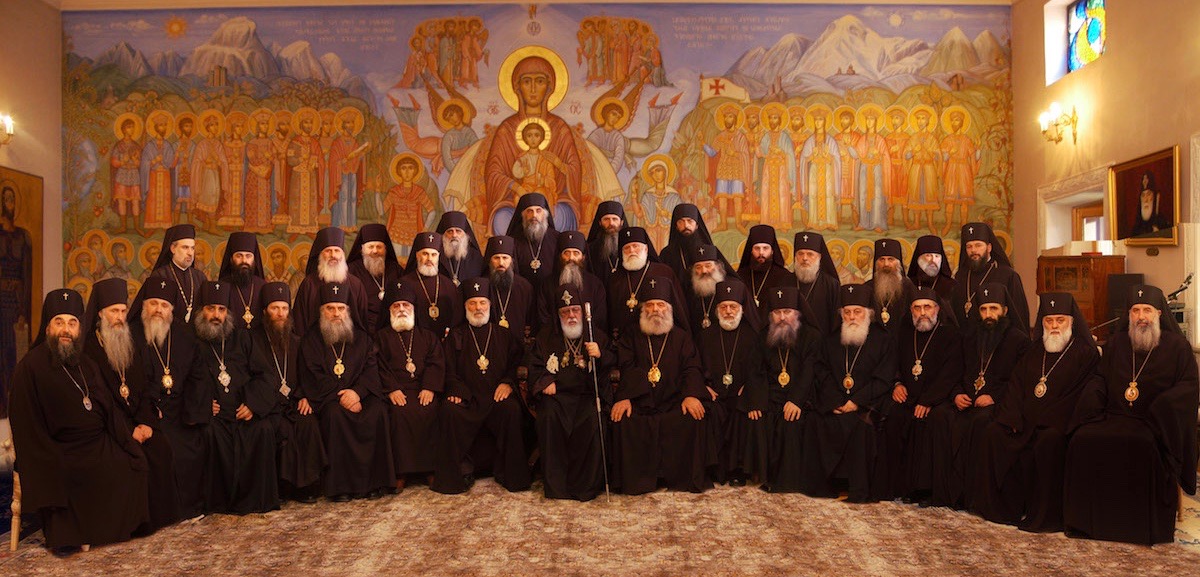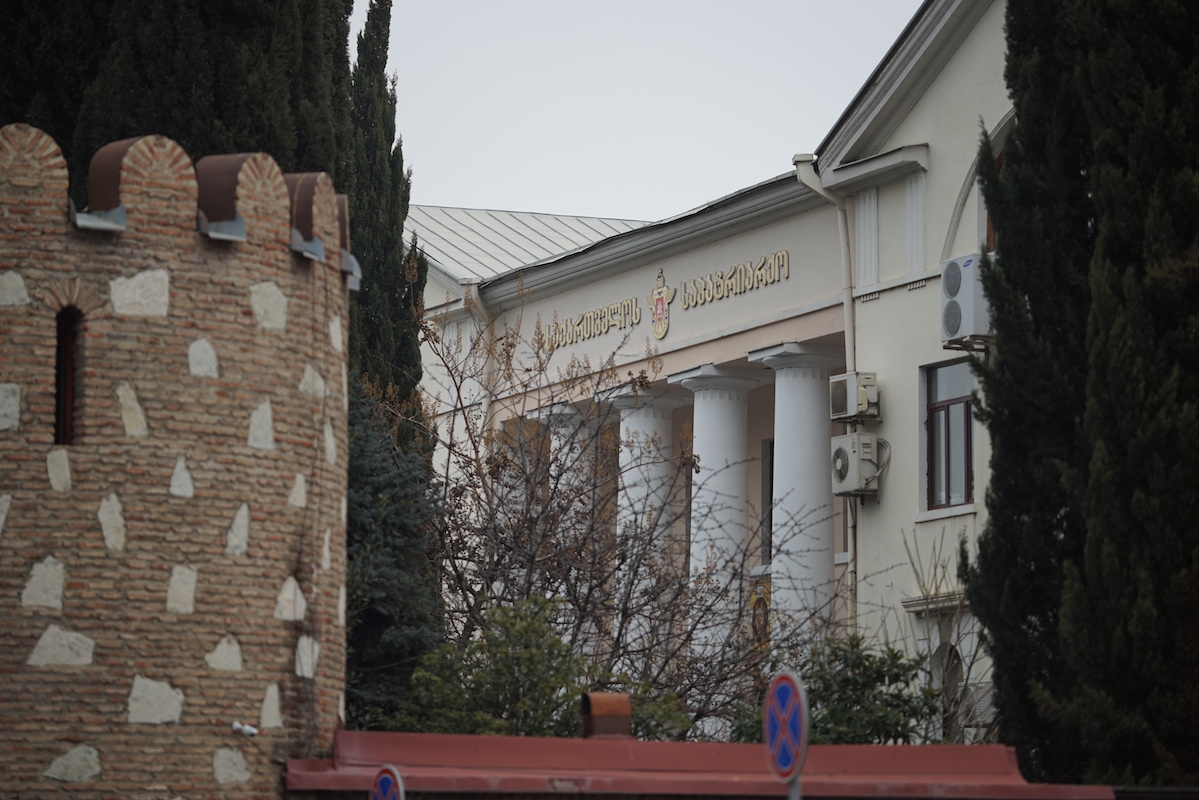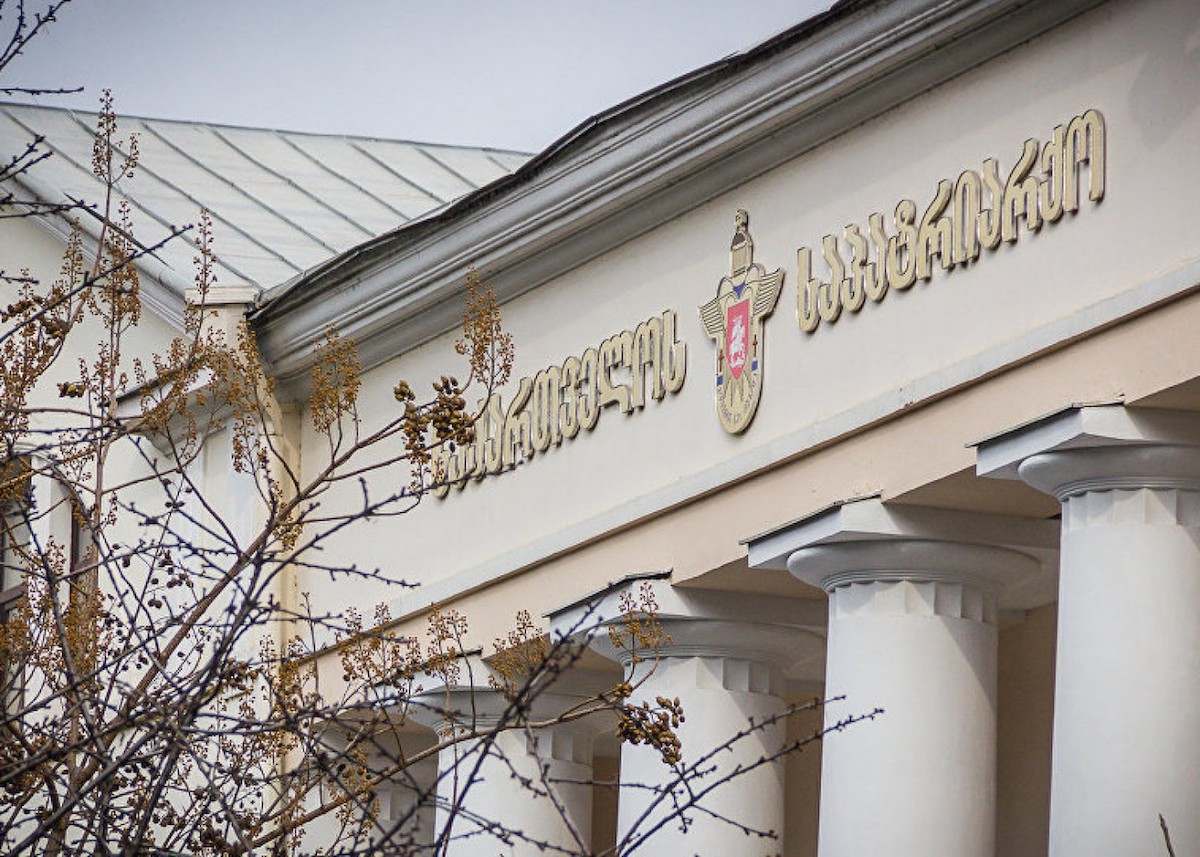How the church became the most influential and wealthy institution in Georgia
Dominance of the Orthodox Church in Georgia
JAMnews prepared three studies on the role of religious institutions in the three countries of the South Caucasus. This one is about Georgia. The studies on Armenia and Azerbaijan can be read at the following links:
“Not a religion, but a way of life” – how the Armenian Apostolic Church became exceptional
“Islam does not have a significant influence on society in Azerbaijan. What does this mean?” Study
For the thirty years of Georgia’s independence, the Georgian Orthodox Church has become one of the wealthiest and most powerful institutions in the nation.
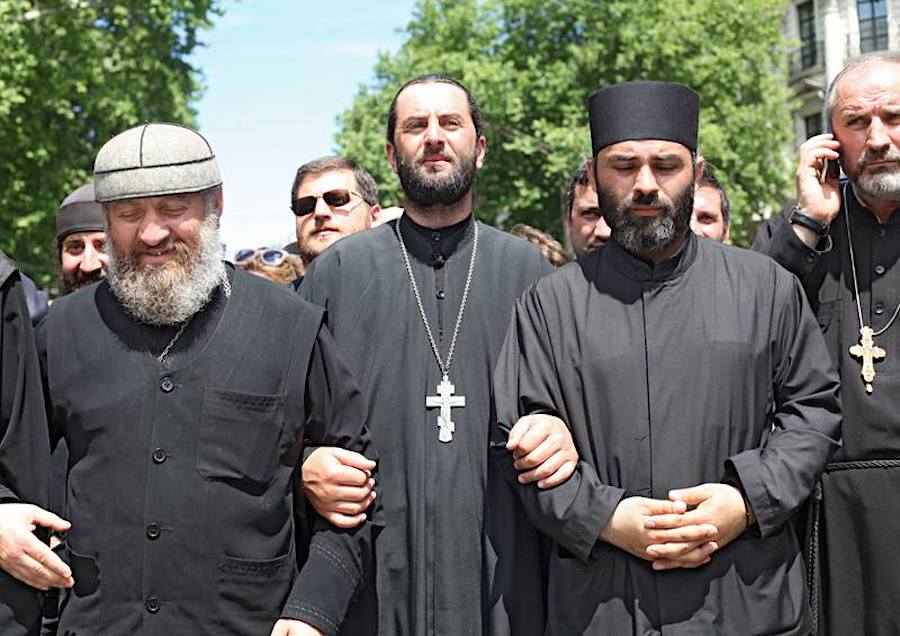
The Church pursues influence over all spheres of political and social life, from school curricula to questions of family organization. At times it attempts to even farther, but encounters resistance from society.
Although much has changed in the country in thirty years, religion still plays a huge role in the life of the country. In public institutions, in schools, in the doctor’s office, even at the bank, you will often see a corner bedecked with icons. On many cars, shops and apartment doors there are special stickers with a cross — a sign that the location has been consecrated by a priest.
Being seen in church with a candle in hand, but in front of the cameras, is an important part of being a politician in Georgia. And getting a picture while kissing the hand of the patriarch, especially during pre-election, is the key to political fortune.
According to a census conducted in 2014, 83.5% of the Georgian population consider themselves Orthodox Christians.
In all opinion polls, the church and the head of the Georgian church, Patriarch Ilya II lead trust ratings among all institutions in the country by a wide margin.
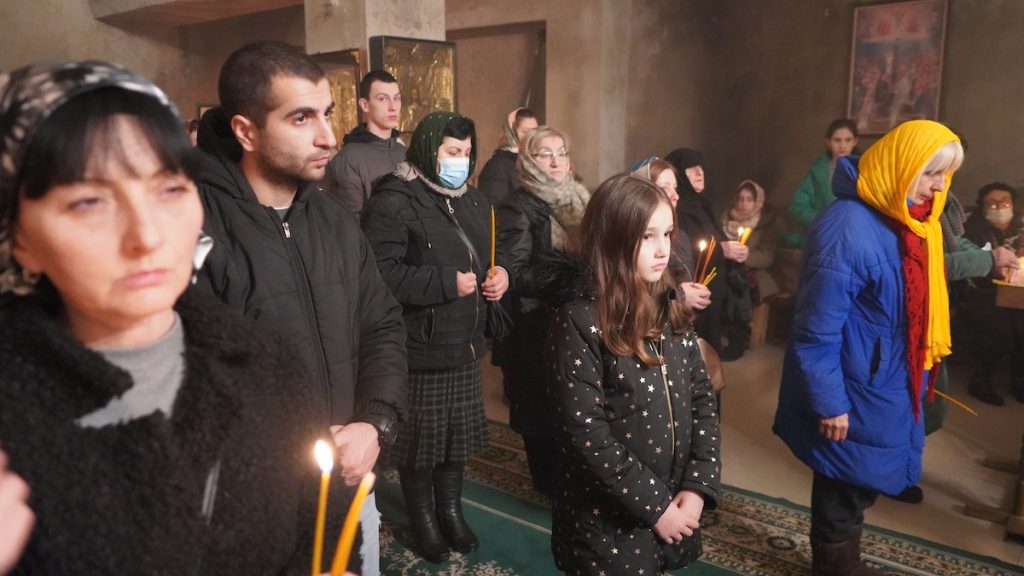
Separate from the state – but replacing state ideology
The revival of Orthodoxy began in Georgia in the early 1990s, a troubled era when religion filled the ideological vacuum that appeared after the collapse of the USSR.
Beka Mindiashvili, theologian and head of the Georgian Tolerance Center, says that over its years of independence every Georgian government, more or less, has contributed to the political strengthening of the church and its formation as a socially influential institution.
Orthodoxy acquired the character of a national ideology during the brief reign of the country’s first president, Zviad Gamsakhurdia.
Then under the rule of Eduard Shevardnadze (1992-2003), against a background of large-scale corruption, crime, economic deprivation and total social insecurity, the Orthodox Church took over almost all the functions of a state institution.
The church became the only institution that created a sense of stability.
Shevardnadze enjoyed great political support from Patriarch Ilya II. For his part, Shevardnadze also did a lot for the church:
● Putting pressure on religious minorities
● Giving the church funding from the state budget
● And in 2002, a constitutional agreement, the so-called Concordat, was signed between the state and the Georgian Orthodox Church, making Orthodoxy a legally privileged religion in the country, and the Catholicos-Patriarch of Georgia’s word inviolable.
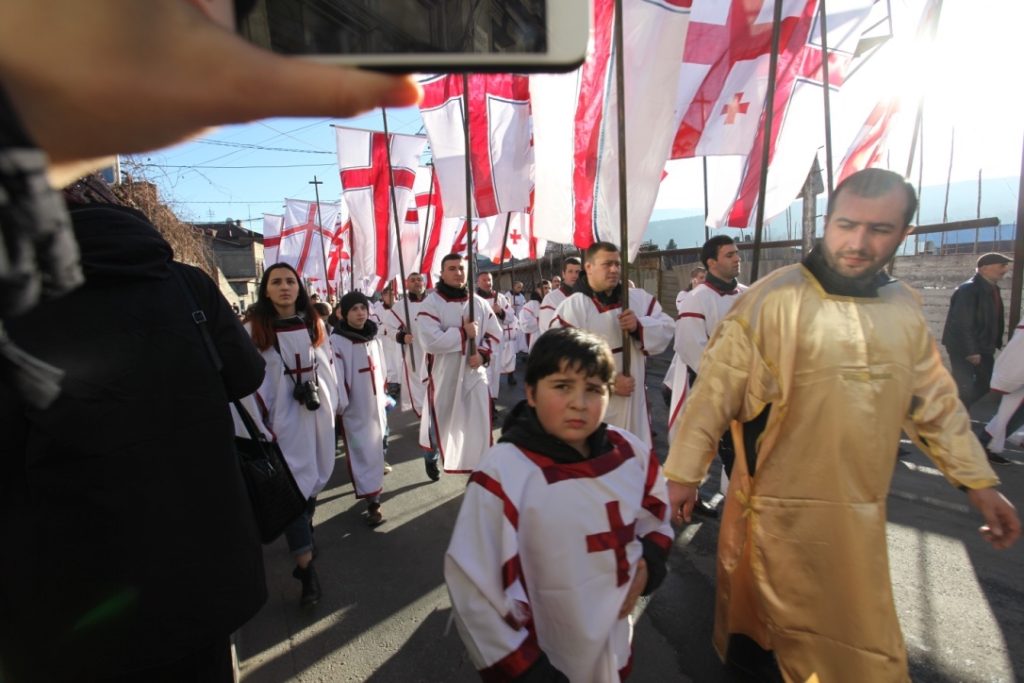
Dominance of the Orthodox Church in Georgia
Saakashvili and the church: a one-way relationship
Relations between the church and the pro-Western authorities after the Rose Revolution in 2003 were much more complicated.
During Mikheil Saakashvili’s administration, legislation on respecting other confessions was improved. Those who violated freedom of religion were prosecuted.
Saakashvili’s government certainly did more than others to achieve religious freedom in Georgia but, as Beka Mindiashvili says, other measures paradoxically strengthened the church.
It was under Saakashvili that the church received its largest annual funding from the budget — 25 million lari [about $9 million]. Saakashvili’s authorities needed the church’s political support to quell the riots of 2008 and agreed to up the ante in return.
But it was no match made in heaven.
In 2012, during the campaign before parliamentary elections, most of the Orthodox clergy openly sided against Saakashvili and for the Georgian Dream party of billionaire Bidzina Ivanishvili.
For example, Archpriest Tariel Sikinchilashvili, rector of the monastery of Elijah the Righteous, affixed the Georgian Dream flag right to the monastery fence, and declared their victory “a miracle of the Lord.”
More harmonious relations are developing between the ruling Georgian Dream and the church to this day, only partly due to religious affinity. And many believe that Ivanishvili achieved what none before him did — taming the church.
“Lay not up treasures on the earth”
Orthodoxy does not have the status of a state religion in Georgia, but the constitution recognizes the special role of Orthodoxy in the history of the country.
Relations between the state and the church in Georgia are regulated by a constitutional agreement, the aforementioned Concordat of 2002.
The document grants the church unlimited rights and places it above other denominations. The Catholicos-Patriarch enjoys immunity from arrest and criminal liability for an indefinite period.
The document also asserts that during the Soviet era the church suffered material and moral damage, and undertakes to compensate for losses it incurred. Thus, since the Concordat, the church has received immense financial support from both the state and taxpayers.
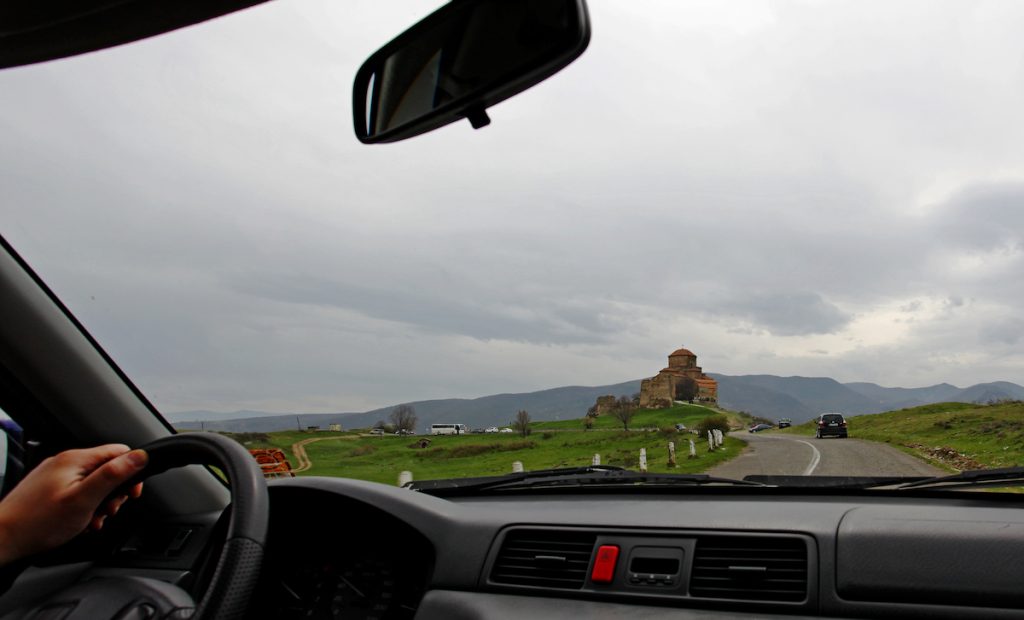
Finances of the Georgian Orthodox Church and how it spends them
Every year the Orthodox Church receives 25 million lari [about $9 million] from the state budget.
The Patriarchate also receives millions of lari from local and municipal budgets, and from the reserve funds of the president and prime minister.
And, of course, there is tithing from the populace, no small revenue in itself.
The Patriarchate uses these funds mainly for religious indoctrination, the construction of new churches and monasteries, and the acquisition of luxury goods.
The Georgian Church is headed by a synod of 47 bishops, 41 of whom are engaged in entrepreneurial activities, enjoying tax and other benefits. The bishops are entitled to own real estate.
According to the public registry, the Patriarchy today owns land with a total area of 62.7 square kilometers, almost equal to the area of the city of Batumi, as well as numerous buildings and other real estate.
The state transferred most of this property to the church at a symbolic price of one lari. Gifts from corporations and the populace were also sources. And the church is not required to pay taxes on any of it.
The patriarch himself — the biggest celebrity
The Georgian Orthodox Church has been headed by Catholicos Patriarch Ilia II (Ilia Shiolashvili) since 1977. His public trust rating is disproportionately higher than that of any other public person in Georgia.
The personal authority of Ilia II is widely believed to be one of the reasons for the Georgian Orthodox Church’s popularity.
On the initiative of the patriarch himself, since 2008 he has personally baptized every third child born to an Orthodox family — spurring many families to have a third child just for the patriarch to christen them.
Good relations with the church: the ticket to political success
The use of the church as an influential institution for political purposes began as early as the 1990s. Funding for the church goes up prior to elections and when there’s a political crisis looming.
For politicians, being seen next to the patriarch and posing with icons and candles is the shortest way to voters’ hearts and the guarantee of a successful career.
Officially, the Georgian Patriarchate supports the pro-Western course of the Georgian government, but in their sermons, priests often preach the exact opposite — that Western values are incompatible with Georgian tradition, unlike Russia, of the same faith.
“When clergy make such statements, it speaks of a certain degree of freedom within the church. They think so and preach so. But this is not necessarily the position of the church, ”Archpriest Andria Jagmaidze, press spokesman for the patriarchate, has stated.
“However, churchmen say that human rights are part of the Soros campaign against the church, and that this is an attempt to destroy it. Of course, such an attitude towards the West and progress impedes social development,” he says.
Jagmaidze believes that although the church declares its support for the country’s Western course, “in fact it impedes the development of the state in the direction of democratization and, in general, the progress of European integration.”
Church everywhere
The hand of the Church is felt at all stages of life, from birth to death, and in a way even before birth. For example, the Georgian church has decreed that babies who die unbaptized will not go to heaven.
In 2014, Elijah II, in his Christmas message, said that children born through artificial insemination would be “problematic”:
“Can a family be happy in which a child is born to a surrogate mother?” the patriarch asked. Of course, one should not forget that the patriarch himself avails himself of the latest achievements of medical progress — he is treated in Germany at an expensive clinic.
At the suggestion of the church, a phrase was written into the Constitution of Georgia stating that marriage is a union between man and woman.
“They want to regulate everything, including who should dress how,” Beka Mindiashvili opines.
“Can a believer rest while swimming in the sea? If so, which swimsuit should be worn by a woman and which by a man? Cut or grow hair. If they meet no resistance, they will infiltrate everywhere.”
The presence of the Georgian Orthodox Church can also be seen in the education system
Human rights activists and educators have been demanding the inclusion of sex education in the school curriculum for many years. But the Patriarchy opposes this.
Representatives of the church came to the parliamentary session, where the issue of introducing sex education lessons was discussed, and actually disrupted the meeting.
There was a case when a biology teacher tried to “put on the true path” a child from a family of Jehovah’s Witnesses. She took him to an Orthodox church and even baptized him secretly from her parents.
There were also cases of physical abuse of a child by classmates when he doubted the existence of God.
“Because of the tyranny of the majority, many people cannot publicly admit that they belong to a different faith,” Mindiashvili says.
The attitude of the church towards roles in the family is also often criticized by human rights activists.
More than once in his addresses, the patriarch stated that “the main thing in the family is the husband.”
When he comes home from work, the wife should offer rest, food, warmth and wash his feet, the Patriarch says.
The fact that the patriarchy is fighting against equality has been repeatedly confirmed by other facts.
Priests take part in all anti-LGBT rallies
On May 17, 2013, clerics and their supporters violently dispersed a peaceful demonstration on “International Day Against Homophobia”.
In 2014 Ilya II came up with a new holiday, which he called the “Day of Familial Holiness”. On this day, parishioners are called to go out walking with their children.
On July 5, 2021, fifty journalists were injured and one died after radicals, including priests, took to the streets to protest the holding of a “Pride” parade.
After that, the radicals erected a large cross near the parliament building which the authorities still have not dismantled.
The cyanide case, and how Georgian Dream tamed the church
For several years now the church has been embroiled in scandals.
The “cyanide case”, the struggle for the “throne” of the 89-year-old patriarch, and secret records about the personal lives and crimes of clergy distributed on the internet have tarnished the church’s reputation.
The first scandal was the so-called “cyanide case” in early 2017, in which Archpriest Giorgi Mamaladze was arrested. According to the initial version of the investigation, he was going to poison the patriarch with sodium cyanide. However, he was later convicted of attempting to poison the assistant secretary of the patriarch.
This led to uncontrolled processes within the church. The clergy divided into different camps, accusing each other of various crimes or grave sins.
It got to the point that one of the members of the synod, Bishop Petre, publicly accused the patriarch himself of “pedophilia” and “sodomy”.
Fuel was added to the fire by a large number of files circulating on the internet in 2021, allegedly reports on secret surveillance of priests.
In the documents, some clergy are reported to be gay, pedophiles, or having extramarital affairs with different women. The documents speak of possible connections between representatives of the Georgian Patriarchate and Moscow, including legal or illegal business of Georgian clergymen in Russia.
While for many years criticism of the church, the patriarch and clergy was taboo in Georgia, in recent years the situation has clearly changed.
These high-profile scandals under the reign of Georgian Dream did not occur without the latter’s participation, certain experts believe.
“And this is the first time in the history of independent Georgia that the authorities managed to win over the church,” Beka Mindiashvili says.










